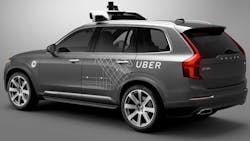Ride Sharing May Provide The Perfect On-Ramp for Self-Driving Cars
Self-driving cars or car-sharing services? Automotive analysts have been debating which technological disruption will offer the best roadmap for personal transportation in America’s not-too-distant future. Will the driver be an expensive, sensor-rigged computer or a stranger with a GPS app on an iPhone Velcro-ed to the dashboard?
The answer may be both.
The car-sharing service Uber recently announced that it intends to launch a fleet of self-driving, specially modified, Volvo sports utility vehicles in the Pittsburgh area.
Meanwhile, NuTonomy, the brainchild of two Massachusetts Institute of Technology scientists, put the world's first self-driving cab fleet (albeit a small one – six taxis) on the streets of Singapore this summer. Upping the futuristic quotient, the company’s two vehicles, a Renault Zoe and a Mitsubishi i-MiEV, are electric powered.
The moves come as Ford unveiled plans to develop a ride-sharing service using autonomous vehicles. And Google’s Waze Carpool, presently an invitation-only kind of car-sharing service, also has been developing self-driving autos. Google, incidentally, just logged 2 million miles on the odometer of its own self-driving car program, but has not yet disclosed a business plan for its vehicles.
Given these developments, it seems that the American auto industry sees its tomorrow, at least in part, based in Silicon Valley and its satellite cities, Cambridge, Mass., and Pittsburgh, the home of the renowned robotics department at Carnegie Mellon University. And the ride sharing phenomenon may be the perfect way to roll out what will likely be expensive technology to the masses.
The public remains skeptical, however, particularly of autonomous vehicles. After all, it was only a few months ago that a Florida man died when his $70,000 Tesla Model S — in “autopilot” mode — slipped under a tractor-trailer. Google has also reported several minor accidents involving its self-driving prototypes, which are limited to 25 miles per hour. (In numerous test drives since May, none of Uber's driverless Volvos have been involved in accidents.)
But this is where the car-sharing phenomenon comes in. Although the system has run into labor and political problems in some cities in the U.S. and abroad, it’s a perfect consumer test market and future sales pitch for both self-driving carmakers and ride-sharing companies. The former will now have the opportunity to showcase its safety, while the latter can explore what amounts to, controversially, perhaps, an inexpensive taxi service without drivers.
Indeed, in Pittsburgh, Uber will offer rides for free, rather than $1.05 a mile, in its fleet of Volvo XC90 SUVs, at least in the beginning. The goal is to get the cost lower than private cars by eliminating the company’s drivers, which currently number about one million.
About 100 self-driving Uber Volvo cars are expected to hit the Pittsburgh streets (and the city’s many bridges, which, incidentally, are problematic for autonomous vehicles, as there are few environmental triggers for the auto’s collision sensors).
For the time being, the cars will have an Uber engineer in the driver’s seat, just in case a human touch is needed on the steering wheel. (Current law requires this, as well.)
Uber and Volvo also have agreed to spend $300 million to develop a 100% autonomous automobile by 2021. The current cars will have a second person in the passenger’s seat, monitoring the experience and taking notes on a laptop.
Riders will be discouraged from asking questions to reduce distractions for the driver or the monitor. Instead, curious fares follow along via a tablet computer in the backseat; that should help explain where they’re going, literally and technologically.
Daron Gifford is the partner leading automotive-industry strategy consulting at accounting and consulting firm, Plante Moran, in Detroit.
